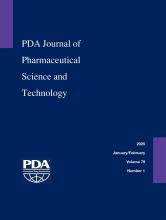Abstract
A detailed overview is provided for the possible patient exposure to highly-potent API (HPAPI) from potential cross-contamination through the lyophilization process. The intent of this paper is to raise awareness of the risk(s) to patients and stimulate the implementation of adequate risk-based controls such as containment process(es), use of adequate surrogates in cleaning validation/verification, and test method-sensitivity-based cleaning validation acceptance conditions. Although lyophilizers are considered to be non-product contact surfaces or indirect product contact surfaces because their surfaces and fixtures usually do not come into direct contact with the product, product contamination can occur at critical locations within a lyophilizer and/or during the unloading process. Contamination of the air due to released product particles can also create a risk. Special attention should therefore be paid to high-potency active pharmaceutical ingredients (HPAPIs) as the permitted daily exposures (PDEs) for patients are particularly low. During a lyophilizer cycle, areas of concern are;- spreading of the lyophilizer HPAPI powder due to air turbulence, contaminated plates, mechanical transfer systems, and spreading due to damaged vials or contaminated surfaces (stainless steel or polymer). Specific considerations for contamination containment for the lyophilizer unloading process are presented. Suggestions are provided for the prevention of patient exposure through cross-contamination via non-direct contact areas. Risk-based cleaning validation/verification strategies are discussed, with specific consideration of the QC test method sensitivity expectations and use of suitable surrogates for lyophilized products in the cleaning verification studies.
- Received December 5, 2018.
- Accepted August 5, 2019.
- Copyright © 2019, Parenteral Drug Association
PDA members receive access to all articles published in the current year and previous volume year. Institutional subscribers received access to all content. Log in below to receive access to this article if you are either of these.
If you are neither or you are a PDA member trying to access an article outside of your membership license, then you must purchase access to this article (below). If you do not have a username or password for JPST, you will be required to create an account prior to purchasing.
Full issue PDFs are for PDA members only.
Note to pda.org users
The PDA and PDA bookstore websites (www.pda.org and www.pda.org/bookstore) are separate websites from the PDA JPST website. When you first join PDA, your initial UserID and Password are sent to HighWirePress to create your PDA JPST account. Subsequent UserrID and Password changes required at the PDA websites will not pass on to PDA JPST and vice versa. If you forget your PDA JPST UserID and/or Password, you can request help to retrieve UserID and reset Password below.






